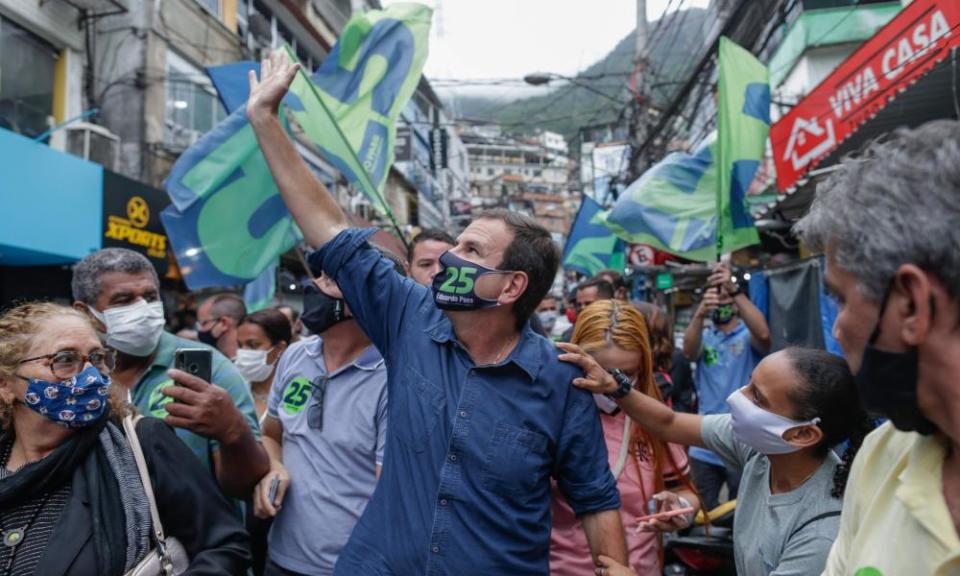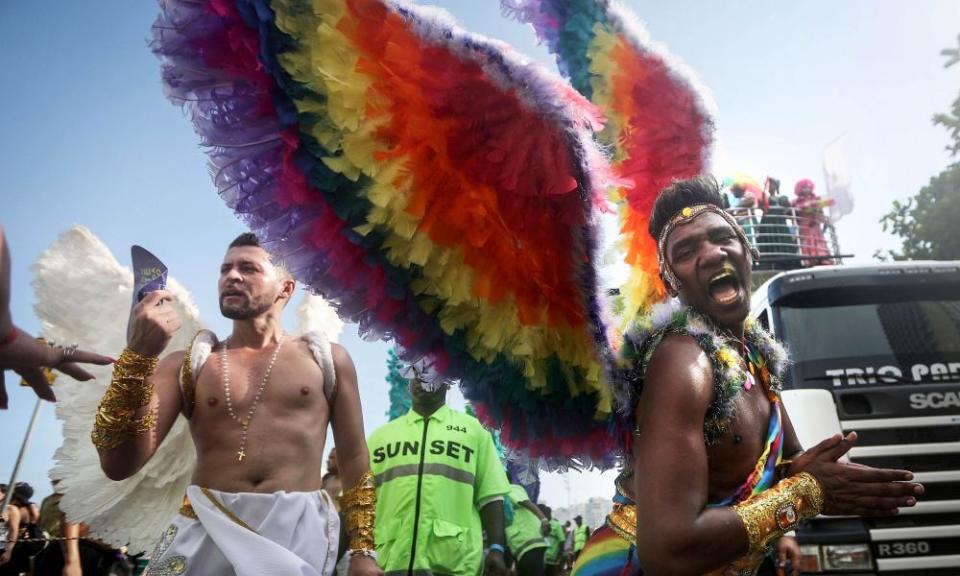Voters set to punish mayor who ‘made Rio de Janeiro miserable’

Tarcísio Motta is one of Rio’s best-known lefties – but when the city elects its new leader on Sunday, he’ll be voting for the right.
“We’ve got a mayor who’s an enemy of the city, and this can’t go on. It’s ludicrous,” complained the socialist councillor, one of millions of exasperated locals desperate to evict the neo-Pentecostal bishop Marcelo Crivella from city hall after what is widely regarded as a dismal four-year reign.
To deny Crivella a second term, leftwing critics such as Motta have one choice: holding their noses and backing his only challenger, the centre-right ex-mayor Eduardo Paes.
“I’ll vote for Eduardo Paes – and I’ll oppose him from day one,” Motta vowed, claiming Crivella’s “authoritarian, fundamentalist, anti-Rio project” had to be stopped. “The city doesn’t deserve this government,” he said. “Our vote is to veto Crivella.”
Crivella won power in 2016, one of the opening acts of a Bible-bashing conservative backlash against Brazil’s left that saw the far-right populist Jair Bolsonaro claim the presidency two years later.
“I’m certain we’re going to build the Rio de Janeiro of our dreams,” Crivella, a gospel singer whose uncle founded the controversial Universal Church of the Kingdom of God, declared in a victory speech peppered with references to God.
Critics say that Crivella’s rule has proved a nightmare, with Brazil’s “marvellous city” experiencing a succession of economic, social and public health crises which they claim he has failed to address.
Rio’s misery culminated in this year’s coronavirus outbreak which has killed more than 13,000 people, making it one of the worst-hit cities in one of the worst-hit countries (171,000 dead) in the world.
Related: Brazilian leftists seek to emulate US Democrats' unity to beat Bolsonaro
“He’s a disaster,” said Álvaro Costa e Silva, a celebrated chronicler of 21st-century Rio, and one of Crivella’s most piercing critics. The columnist said he was compiling a list of the least-loved administrators in Rio’s 455-year history and found few on Crivella’s level – not even Estácio de Sá, the Portuguese soldier who founded the city in 1565 and “probably wasn’t very popular because he died after an indigenous person shot him with an arrow”.
“I think Crivella will be remembered as a mayor to be forgotten – a mayor voters got rid of so he could be forgotten and never come back,” Costa e Silva said of a politician so unpopular that some detractors call him Rio’s “Calamity”.
High on the list of Crivella’s perceived sins are accusations that he governed for his church’s congregations, not all citizens, and tried to lead the culturally vibrant city down a conservative and intolerant path. He cut funding for Rio’s film festival and LGBT pride parade and sparked protests by trying to ban a graphic novel from a book fair because it featured a cartoon of two kissing men. He faced further anger during this year’s Covid-19 epidemic after installing a publicly funded MRI scanner on the grounds of a Universal Church temple in one Rio favela.
But Crivella’s indifference towards one of Rio’s most cherished cultural institutions, its annual carnival, caused particular indignation, with many sambistas accusing him of waging a puritanical campaign against festivities his church considered an ungodly depravity. “He’s perhaps the first mayor not to attend the carnival parades,” Costa e Silva said, noting how Crivella once skipped town altogether during the celebrations.
Paes, Rio’s mayor from 2009 to 2016, this week alleged Crivella was “on a crusade against carnival” and acknowledged many were only backing him because they loathed Crivella.
Motta, the socialist councillor, said Rio’s woes under Crivella went beyond culture wars. “The transport system doesn’t work. The schools are falling to pieces. Health care has gotten worse … and he hasn’t managed to improve things,” he claimed.
“Rio has become a much sadder place in these last four years,” he added. “Having a city hall that seems not to like the city, who tries to alter the city’s very essence, and doesn’t respect Rio’s diversity, has made things so much gloomier.”
Polls suggest that voters agree, with Crivella – who blames his failures on the corruption of previous governments – apparently heading for a landslide defeat.

Motta said he hoped Crivella’s demise would kickstart a new, progressive phase in the history of Rio, and perhaps even Brazil. A series of electoral setbacks to Jair Bolsonaro’s rightwing project have given leftists hope the political tide may be turning. Support for the former army captain remains strong in rural areas and among older voters but has slipped in many of the country’s biggest cities.
“Many people want genuine change and have realised the 2018 vote for [Bolsonaro’s] authoritarianism and hatred has not brought the change these pushers of hate promised,” Motta claimed.
Costa e Silva said he felt relief Rio would soon be free of Crivella’s diabolical grip but warned his city was not out of the woods yet. The new mayor would face a crippling post-pandemic economic crisis and the growing threat of armed paramilitary gangs that now control more than half the city. “I don’t know if this is a new era – but I’m certain a new era will only be possible without Crivella,” he said. “He represents the past, the shadows – it’s impossible for him to represent anything that is new.”

